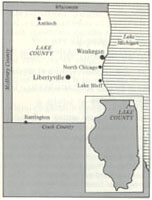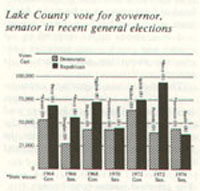By ED NASH
Political editor of The News-Sun,
Waukegan, since 1969, he has covered
the Illinois General Assembly since 1959.
Nash is a graduate of Yale and joined
The News-Sun in 1955 after working
for the Pampa (Texas) Daily News and
New York Times.
Lake County: Once a GOP bastion, but not any more
|

|
Since 1968, the Democrats
have been gaining ground
in the state's third most
populous county. Walker's
home is there, and Gov.
Stratton was born there.
Gov. Stevenson lived in
Libertyville, Gov. Kerner
had Antioch summer home.
The area's two congressmen,
McClory and Crane, are
in presidential politics
on opposing sides. But
patronage plums seem few in
county with 12 legislators
LAKE COUNTY, tucked away in the
northeastern corner of Illinois, is the
third most populous county in the state,
the sixth wealthiest county in the United
States, and supposedly the second
fastest growing county among the more
than 3,000 nationwide. And it used to be
a Republican bastion. But not any
more. Five years ago, before Watergate,
the Democrats began chipping away in
earnest at the GOP fortress that was
Lake County.
|
It must rankle the hearts of the
Republican faithful nowadays to look at
the occupant of the Executive Mansion
in Springfield. Dan Walker is from
Lake County, to be sure, but a Democrat! And the GOP helped elect him four
years ago by crossing over into the
Democratic primary, thinking they were
giving Republican Richard B. Ogilvie a
better chance at reelection.
For more than a century, the Republicans in Lake County had it all their
own way. No Democratic judge donned
a robe in the Lake County Courthouse
in Waukegan until 1964. The Republicans have dominated the Lake County
Board, the county's governing body.
And only one Democratic sheriff and
one Democratic county clerk broke the
Republican reign over the nine elective
county offices and they were quickly
dispatched in the next election.
Then came 1970. And with it came the
election of only the third Democrat to
Lake County since the Civil War. Grace
Mary Stern, wife of Democratic county
chairman Herbert L. Stern, symbolized
the start of a changing political climate
when she became county clerk.
The first sign of growing Democratic
power came in 1968. Democrat Adlai E.
Stevenson III, the son of the late Gov.
Stevenson, the Libertyville resident who
ran twice for the presidency, ran against
the Republican incumbent, Ralph T.
Smith, for U. S. Senate. Stevenson beat him statewide, but the significance in
Lake County was that Stevenson came
within 600 votes of Smith out of more
than 93,000 cast in Lake County. Until
then, GOP candidates for statewide
office had routinely clobbered their
Democratic opponents in the county.
It was two years later that Walker, the
Democrat from Deerfield, made Illinois
political history by wiping out the
candidate endorsed by the Democratic
party in the primary and then whipping
the Republican hierarchy in the election. But even Walker couldn't beat his
GOP opponent in his home county.
Ogilvie defeated him by more than
10,000 votes out of more than 139,000
cast in Lake County.
By 1974, Lake County Democrats
thought they had a real opportunity at
the polls. Certainly Watergate, they
figured, could do them no harm. But the
election results were beyond their
greatest expectations: the first Democratic circuit court judge in a decade; the
first Democratic sheriff since the turn of
the century; the first Democratic state
senator in history; and the first Democrat ever reelected to county office,
giving the Democrats two elected
county officers. To put the icing on the
cake, both Democrats running for
statewide office Stevenson and State
Treasurer Alan J. Dixon received
winning margins in Lake County that
were inconceivable 10 years ago.
Now comes 1976. In a reversal of
what has happened in the past, more
potential Democratic candidates than
prospective Republican candidates
announced for office. This is not to say
the county's Republicans are giving up.
They are not. The GOP does, however,
have at least one problem: although they
hold all five county offices on the
election block in 1976, three of the
incumbents are not seeking reelection.
16 / March 1976 / Illinois Issues
The governorship has an extra dimension of interest for Lake County voters.
This is because several Illinois governors have ties to the county. Besides
Walker and late Gov. Stevenson, Gov.
William G. Stratton is a native of
Ingleside, and Gov. Otto Kerner used to
maintain a summer home at Antioch. It
is Walker, in fact, who stimulated the
gubernatorial ambitions of a couple of
Lake County area politicos. Veteran
State Rep. Daniel M. Pierce (D.,
Highland Park), who broke with Walker over the governor's proposed accelerated building program "a cruel
hoax," Pierce called it toyed with the
idea of taking on Walker in the primary.
And Republican State Comptroller
George W. Lindberg of Crystal Lake,
just over the Lake-McHenry County
line, who has harped at Walker's "fiscal
irresponsibility" for the last year, also
considered for a time running for chief
executive.
Lake County political officials of
both parties have taken a great interest
in the upcoming gubernatorial primaries. The former politician-busting
U.S. attorney, James R. Thompson, is
generally considered the front-running
candidate for the GOP gubernatorial
nod. But who has been squired around
to various GOP county functions by
Lake County GOP Chairman W. J.
Murphy, the retired two-decade state
representative? None other than the
other GOP candidate for governor, the
little-known Richard H. Cooper, the
multi-millionaire Weight Watchers
chieftain. And, for some reason,
Thompson didn't seem to know about
the affairs. At least, he wasn't there.
On the Democratic side, just look at
what happened at the annual golf outing
and dinner. Secretary of State Michael
J. Hewlett was the announced featured
speaker. Then State Treasurer Alan
Dixon, who had not yet announced he
was running for governor, said he was
coining. And, 72 hours before the affair,
Walker said he was, too. The result was
that, perhaps for the first time in the
history of political parties, the dinner
was served on time. That enabled both
Dixon and Hewlett, whom a lot of
Democrats wanted to run for governor,
to make their speeches and then leave
just 21 minutes before Walker arrived.
In introducing Walker, Rep. John S.
Matijevich of North Chicago, the only
other Lake County Democrat in the
Illinois House and one of the initiators
of the House leadership "reform" movement, startled Pierce by stating he
was supporting Walker for reelection.
Lake County's two Republican congressmen have been getting themselves
involved, too, in presidential politics,
but on opposing sides. U. S. Representative Robert McClory of Lake Bluff
has been a strong supporter of President
Gerald R. Ford, while U. S. Rep. Philip
M. Crane (R., Mount Prospect), has
been the only prominent Illinois Republican to back former California Gov.
Ronald Reagan. Crane set up the state's
Reagan citizens committee, which was
perhaps his way of thanking Reagan for
speaking at Crane's testimonial dinner
earlier in the year. Not to be outdone,
McClory lined up Vice President Nelson
A. Rockefeller for his testimonial dinner
in Lake County in November of last year.
The county's Democrats, somewhat
bewildered by the plethora of presidential contenders in their party, have
been content to maintain an "open
door" policy for them to visit Lake
County. So far, U. S. Rep. Morris K.
Udall of Arizona, U. S. Sen. Lloyd M.
Bentsen, Jr., of Texas and former Gov.
Jimmy H. Carter of Georgia have
spoken in the county.
|

|
The factions within the two parties in
Lake County promise some spirited
competition in the primaries. But there's
slate-making scheduled, too. For years,
the Democrats had their problems just
getting the names of bodies to place on
their primary ballots. But they have
gradually been doing more slating. It
was in 1974 that they went all spring and
summer without a candidate for sheriff,
finally slating one just before Labor Day and he won.
The Republicans tried slate-making
once, a decade ago an "endorsement
convention," they called it and the
only one slated who didn't win in the
primary was the county party chairman.
But the present chairman, Murphy, is
planning to revive slate-making this time around.
|
The Lake County area the county
and a few miles into neighboring
McHenry County is well represented
in all three branches of state government.
Two of the six elective state officers,
Walker and Lindberg, are from the area,
and one of the seven state Supreme
Court justices, Walter V. Schaefer, is
from Lake Bluff. When Schaefer retires
at the end of 1976, he may be replaced by
another Lake County resident, Thomas
J. Moran of Waukegan, now an Appellate Court justice. The county has 12 of
the 236 members of the General Assembly more than 5 per cent including
two of the 14 women in the legislature, a
Senate minority leader (John A. Graham, R., Barrington) and two House
committee chairmen (Pierce and Matijevich).
Despite all this clout, however, both
Murphy and County Democratic Chairman Herbert L. "Hub" Stern agree that
when it comes to patronage for the
county, there is much to be desired.
Beset with money woes, both parties use
traditional ways to raise funds: picnics,
golf outings, dinners. In past months the
Democrats have also had a carnival and
a concert, and the GOP had an ad book.
But these devices have not produced
enough, and both parties say that they
will have to come up with more imaginative methods of getting money. There
are no assessments of job-holders, both
parties profess. And they lament that
contributions from businessmen, labor
leaders and others are not what they might be.
As for Lake County getting a fair
share of highways, public buildings and
institutions, the only thing the GOP
chairman could mention in addition to a
couple of state parks and a state
highway garage was the Waukegan
Developmental Center for mentally
retarded young adults, which is partially
in operation and should be in full
operation for 360 persons next summer.
The Democratic chairman said he had
no reason to believe the county had been
discriminated against.
March 1976 / Illinois Issues / 17

